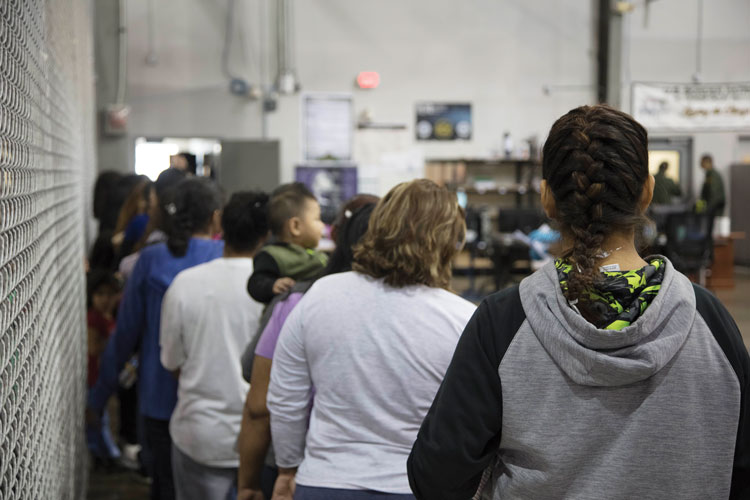Government reunites many but not all immigrant families by deadline

Photo courtesy of U.S. Customs and Border Protection.
Updated: At the arrival of the July 26 deadline for reuniting immigrant families forcibly separated by the Trump administration's "zero tolerance" policy, the federal government says it has reunited all of the families in which it believes parents are eligible to retake custody of their children—but the American Civil Liberties Union is raising questions about how eligibility is defined.
According to a joint status report, as of 6 a.m. Thursday, the federal government had discharged 1,820 children from the custody of the Department of Health and Human Services. The majority of those, 1,442, were reunited with parents in the custody of Immigration and Customs Enforcement. Another 378 were discharged in what the government called “other appropriate circumstances,” which included reunification with parents not in custody, reunification with parents in custody outside of the court order, discharge to another adult sponsor or turning 18.
Another 711 children remained in federal custody, the filing says. The majority of these are cases where the parents couldn’t be located, because they’d been deported (affecting 431 children) or released into the United States (79 children), or because the government was still trying to locate the parent (94 children). The filing says 120 parents waived reunification with their children; most of the rest had some kind of red flag the government believed made them ineligible to retake custody.
Those numbers were filed in response to the order of U.S. District Judge Dana Sabraw, who gave July 26 as the deadline for reuniting children ages 5 and older with their families. Younger children were subject to an earlier July 10 deadline; the government met the deadline for roughly half.
At a hearing Tuesday in San Diego federal court, the Associated Press says the federal government declared success, with Justice Department lawyer Scott Stewart telling Judge Dana Sabraw that they had many reasons to be proud.
But ACLU attorney Lee Gelernt, the lead lawyer for the class of plaintiffs suing over the family separation policy, told the Associated Press that by narrowing the class of parents it deems eligible, the federal government is lowering the bar for itself.
“I think the critical point to remember is that they are only reunifying by the deadline those families who they are claiming unilaterally are eligible for reunification by the deadline,” he said.
The ACLU has other problems with the process. In court papers filed Wednesday, the ACLU argues that the federal government intends to deport families immediately upon reunification, “with no meaningful opportunity to receive legal advice and make a considered family decision about whether their children should remain in the United States without them.”
That filing also says parents are being pressured to sign forms waiving their right to reunification, and sometimes misled about those forms’ content. Some of those parents are illiterate or were given forms in languages they don’t understand, the ACLU alleges. Douglas Almendarez, a Honduran who was deported without his 11-year-old son, told Reuters he was led to believe that agreeing to deportation was the only way they’d be reunited.
“They told me: ‘He’s ahead of you’,” said Almendarez. “It was a lie.”
The court will hold a status conference Friday.
The underlying ACLU lawsuit was filed in February, but public outrage about the family separations intensified in June. That caused President Donald Trump to walk back his administration’s policy. On June 26, Sabraw ordered a stop to separations that were not in children’s best interests, and ordered reunification in 30 days. That’s the deadline that arrived Thursday. He later ordered a stop to deportations of reunited families.
Protests of the policy continue; Reuters noted that one was held Thursday outside the McAllen, Texas federal court and another in Washington, D.C. The Department of Homeland Security’s Office of the Inspector General has acceded to congressional requests for an investigation into the family separations policy, the AP says. Nongovernmental organizations and volunteers have stepped in to shelter, feed and reunite families as needed.
ABA President Hilarie Bass has repeatedly denounced the family separation policy, and went to Texas in June to meet with immigrants and the lawyers working with them. This month, she called on America’s lawyers to volunteer, donate and advocate to help the families.
Updated at 5:50 p.m. with numbers from more recent status report.



